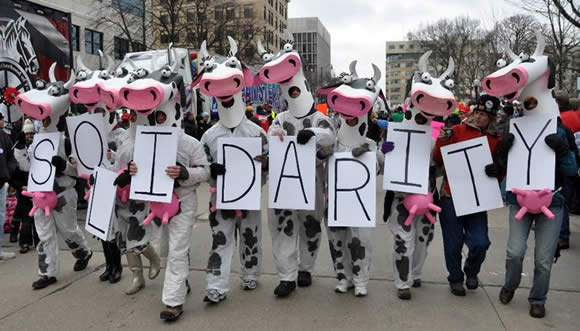
Family Farm Defenders stands in solidarity with our many allies at this historic juncture of the justice struggle in the U.S. and around the world. The police murder of George Floyd in Minneapolis, MN and Breonna Taylor in Louisville, KY (and so many more before them) has re-exposed the systemic racism that underlies our criminal justice system, as well as the many other stark inequities in other public services (education, housing, healthcare), that we have ALL paid for with our tax money, yet remain unaccountable to the people. Our 21st century policing apparatus has its origins in 19th century slave patrols, while our prison industrial complex is based on a sordid loophole in the 13th Amendment of the U.S. Constitution that extended the conditions of slavery onto the backs of the incarcerated.
Thankfully, there have always been those who have challenged racial injustice and state terrorism, and it is encouraging to see the reemergence of grassroots resistance today – from large cities to small towns across the whole country, and even around the globe. From Toussaint L’Ouverture’s Haitian Revolution to Harriet Tubman’s Combahee Ferry Raid, from the battle of Wounded Knee to the protest at Standing Rock, from the Attica Prison Uprising to the Ferguson MO Revolt, from the Black Panthers to the Young Lords and Brown Berets to the American Indian Movement, communities of color have always borne the brunt of this fight and remain leaders in this current struggle. Many allies have joined in these efforts – from the Abolitionist Underground Railroad through the Civil Rights Movement – and this moment for solidarity stands before us again today. Family Farm Defenders itself grew in part out of an empowering rural exchange organized by our founder, John Kinsman, back in the 1960s bringing children and their families together between Wisconsin and Mississippi in open defiance of Jim Crow segregation and widespread racist hatred.
Here are some personal thoughts from current FFD board members that may inspire others to take action!
FFD president, Joel Greeno, who farms near Kendall, WI, says, “The Minneapolis police awakened the rage of a people that have been exploited for thousands of years, and in the United States, ever since the first African person was brought here as a slave. Black people in this country have been victims of predatory lending, have had their land stolen from them, and have suffered other forms of violence for too long. If people are uncomfortable with seeing what’s going on, well, that’s too bad. It’s our job to stand up now with the people making their voices heard. We shouldn’t get too distracted by rioting and looting, for the need to combat racial injustice is long overdue.”
FFD vice president, Anthony Pahnke, in San Francisco, CA, adds, “It’s great to see nationwide protests denouncing police violence. To see so many people, Black and Brown, Indigenous and white, stand together to not just demand real changes to the police, but to speak out against racism in this country. These mobilizations should be an example to all of us that to make Black Lives Matter requires real action from all of us. Many in Family Farm Defenders have long histories working in multiracial coalitions to challenge historical injustices in the food, farming, and fiber system. Now, more than ever, we will continue that work.”
FFD board member, Lisa Griffith, from Belleville, IL notes: “White people of privilege, like me, will never fully comprehend or compensate for the life, livelihood and land taken from Black and Brown people on this earth but we must acknowledge these crimes, adopt the resilience of the oppressed, and not just join but lead the struggle for justice, reparations, and peace. We are all human beings, and none should be offered more or less opportunity, respect or compassion due to the color of their skin.”
FFD board member, Stephen Bartlett, who also directs Sustainable Agriculture of Louisville, KY remarks: “I am an anti-racist because we are all created in the image of our species homo sapien/ neanderthal and because slavery is a sin of human predatory selfishness and power lust. To justify the colonial and post-colonial and later neoliberal agenda of conquest, theft, genocide and enslavement to pursue greed and machismo, Europeans invented a dogma of white supremacy that over generations transformed into a beast that continues to steal abuse marginalize and dehumanize. Whether it is land concentration, red lining, predatory debt, school to prison pipeline and mass incarceration, racist inspired murderous policing, racism is an evil which together with it’s twin brother capitalism, must be restrained and ultimately overthrown if humanity is to survive the world humanity has wrought.”
FFD board member, Rebecca Goodman, from Wonewoc, WI, writes: As a white woman of privilege, there is no way I will ever truly know how it feels to be a person of color. All I can do is to stand with them, listen, and learn. Don’t think the learning will ever stop. My heart aches.”
Lastly, Jim Goodman, another FFD board member from Wonewoc, WI states, “Ever since the colonization of America, institutional racism has always been an accepted and normalized part of the American ethos– and it still is. The genocide of the indigenous, the institution of slavery and Jim Crow segregation, have evolved into environmental, social and economic racism that continue to this day. As a white male I know that I have benefited from white privilege, we all have. The wealth of our nation was built on stolen land, stolen lives and the labor and murder of millions of people of color. We must admit our guilt, listen to those we continue to oppress and make the changes they demand.”
Current efforts to ban police chokeholds, limit use of deadly tear gas, block federal transfer of military style weaponry for domestic deployment, remove offensive historic statues, get cops out of schools, decarcerate non-violent offenders, create empowered citizen police oversight committees, and redirect public funds away from abusive law enforcement agencies are all a good start – but there is so much more we can and should do to rectify the violent legacy of racial injustice in our society.
We must consider economic reparations for those communities of color who literally had their ancestors’ lands and lives stolen from them for centuries to make the “American Dream” possible. For this unprecedented just transition to occur, we will need to seriously question the current distribution of wealth and property in our country. How did so few come to control so much? And we need to also reconsider our political system that has become so undemocratic and clearly enabled this disparity to fester. How did the majority lose their voice?” As Martin Luther King Jr. once said, “There can be no justice without peace and there can be no peace without justice.” Family Farm Defenders looks forward to engaging in this struggle with many others to bring about a better world.
Please consider supporting these FFD allies in their racial justice and food sovereignty work:
Border Agricultural Workers Project: https://www.farmworkers.org/bawppage.html
Coalition of Immokalee Workers: https://ciw-online.org/
Community to Community: http://www.foodjustice.org/
Detroit Black Community Food Security Network: https://www.dbcfsn.org/
Farmworker Association of Florida: https://floridafarmworkers.org/
Federation of Southern Cooperatives Land Assistance Fund: https://www.federation.coop/
Food Chain Workers Alliance: http://foodchainworkers.org/
Getting Food Grown Collective: https://www.gettinggrowncollective.com/farmfoodfamilias
HEAL Food Alliance: https://healfoodalliance.org/
Hmong American Farmers Association: https://www.hmongfarmers.com/
Honor the Earth: http://www.honorearth.org/
Indigenous Environmental Network: https://www.ienearth.org/
Intertribal Agricultural Council: https://www.indianag.org/
Land Loss Prevention Project: https://www.landloss.org/
Migrant Justice / Justicia Migrante: https://migrantjustice.net/
National Black Farmers Association: http://www.nationalblackfarmersassociation.org/
National Latino Farmers and Ranchers Association: https://www.nlfrta.org/
Southeastern African American Farmers Organic Network: http://saafon.org/
Urban Tilth: https://www.urbantilth.org/
Voces de la Frontera: https://vdlf.org/



